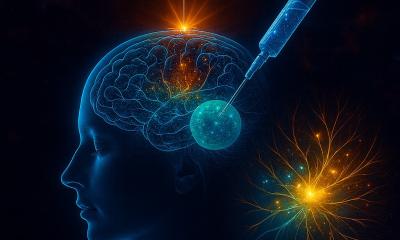Image source: Adobe Stock/Gorodenkoff
News • Circulating biomarkers
Blood tests shows brain impact of neurosurgery
Damage to the brains of patients operated on for brain tumors may be assessed by measuring biomarkers in the blood pre- and postoperatively. A new study by University of Gothenburg researchers shows that the increase in markers tallies well with the impairment caused by insufficient blood flow.
The clinical research was published in the journal Neurosurgery.
Today, examination with a magnetic camera (magnetic resonance imaging, MRI) is used after a brain operation to determine whether it has damaged the patient’s brain. MRI can identify bleeding (hemorrhage) and brain areas impaired by inadequate blood flow (ischemia). “MRI scans can’t always provide sufficiently detailed information about the degree of cell injury. In the long run, the new biomarkers could bridge this knowledge gap and offer more accurate and objective assessments of impairment due to brain tumor surgery,” says Isak Michaëlsson, a doctoral student at the University of Gothenburg and resident in neurosurgery at Sahlgrenska University Hospital.

Image source: Göteborgs universitet
The biomarkers that have now been investigated in patients operated on for brain tumor are well studied within the area of neurological diseases, especially Alzheimer's and other dementias and in patients with traumatic brain injuries. The markers examined are known as neurofilament light (NfL), glial fibrillary acidic protein (GFAP), and tau protein. NfL is a marker for damage to nerve cell fibers, GFAP for injury to the brain’s supportive cells and tau for nerve-cell impairment.
The present study comprises 34 adult patients with glioma, one of the most common types of brain tumor. The concentration of biomarkers was initially measured the day before surgery and then one, three, five, and ten days after the procedure. The study shows that the levels of markers in the blood correlates both with the extent of injury caused by lack of oxygen that occurred during surgery and with the severity of neurological deficit suffered by the patients.
Measuring biomarkers in blood samples may become a new way to evaluate injuries caused by neurosurgery, thus enabling comparison of surgical methods. Isak Michaëlsson again: “It’s also conceivable that high levels of these markers might be signs of damage that could cause brain fatigue or other cognitive problems for the patients in the somewhat longer term. If so, the markers could be used to identify patients at an early stage so that they get the right kind of rehabilitation”.
Source: University of Gothenburg
30.05.2023











